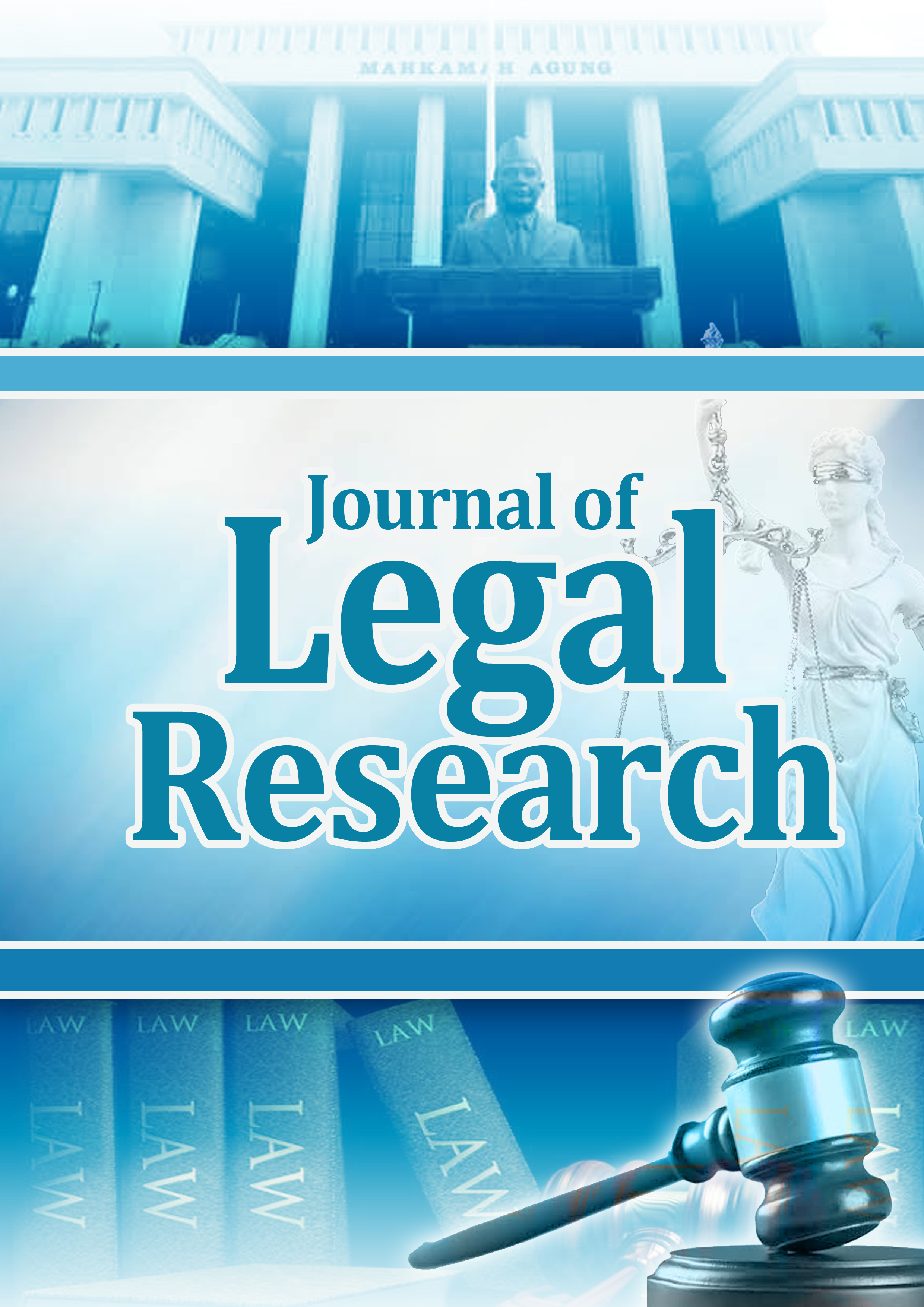Analisis Penegakan Kebiri Kimia Bagi Pelaku Tindak Pidana Kekerasan Seksual Pada Anak Di bawah Umur
DOI:
https://doi.org/10.15408/jlr.v1i6.15092Keywords:
Keyword, Law enforcement, chemical castration, and sexual crimeAbstract
Abstrak
Country can be said to be a state if elements of the state have been fulfilled. One of the most fundamental elements is the existence of the people. The existence of the people means that there are people who live and become subjects of government and enforced rules. Without rules, the consequence is that there will be a large number of crimes that cannot be overcome. Therefore criminal law exists to optimize a regulation and implementation in the community. In the constitution of the Indonesian state, there has been guaranteed the rights of everyone from the right to life, the right not to be tortured, the right to religion and human rights that cannot be reduced in any case. But with Article 81 A paragraph (3) of Law No. 17 of 2016 concerning the second amendment to Law No. 3 of 2002 concerning Child Protection. In this article the phrase the addition of basic crimes especially chemical castration punishment becomes a problem that causes controversy among the public. So the government needs to reconsider with regard to Article a quo by using preventive and repressive measures to address these problems. The theory that author use is Law Enforcement along with the principles of das sein and das sollen. With normative research methods that are descriptive, and through a conceptual approach. So the author recommend that the application of chemical castration and rehabilitation as a form of treatment oriented to protect perpetrators and sexual crimes.
Downloads
References
(n.d.). Retrieved from https://www.komnasperempuan.go.id/publikasi-catatan-tahunan?page=2,
Alkostar, A. (2008). Korupsi Politik di Negara Modern. Yogyakarta: FH UII Press.
Andenaes, J. (1976). Punisment and Deterrence. London: University of Chicago Press.
Dellyana, S. (1998). Konsep Penegakan Hukum. Yogyakarta.
Desmita. (2012). Psikologi Perkembangan . Bandung: PT Remaja Rosdakarya.
Eddyono, S. W. (2016). Menguji Euphoria Kebiri. Jakarta: Institusi for Criminal Justice Reform.
EdmodscOswald, Z. (n.d.). Analayzing the Sex Disparity in Chemical Castration Sentences. Michigan Journal of Gender and Law, 19(471), 484.
H.Z, P., & N.L, L. (2010). Pengantar Psikologis dalam Keperawatan. Jakarta: Kencana.
Hairi, P. J. (2015). Problem Kekerasan Seksual: Menelaah Arah Kebijakan Pemerintah dalam Penanggulangannya. Jurnal Negara Hukum, 6(1), 7.
Handayani, D. (2020, Maret 23). Retrieved from Kata Data: https://databoks.katadata.co.id/datapublish/2019/09/17/angka-kekerasan-terhadap-perempuan-cenderung-meningkat,
Huraerah. (2007). Kekerasan Terhadap Anak. Jakarta: Penerbit Nuansa.
J, N., A, R., & Greeneb. (2003). Psikologi Abnormal. Jakarta: Penerbi Erlangga.
Lamnitang. (1981). Kitab Pelajaran Hukum Pidana; Leeboek Van Het Nederlanches Stafrecht. Bandung: Pionir.
Mardiya, N. Q. (2017). Implementation of Chemical Castration Punishment for Sexual Offender. Jurnal Konstitusi, 220.
Mashlihah. (2013). Play Therapy dalam Identifikasi Kasus Kekerasan Seksual terhadap Anak. Jurnal Penelitian Psikologi Fakultas Psikologi UPI, 1(1), 21.
Merpaung, L. (1996). Kejahatan Terhadap Kesusilaan dan Masalah Prevensinya. Jakarta: Sinar Grafika.
Moeljatno. (1993). Asas-Asas Hukum Pidana. Jakarta: PT Bima Aksara.
Morris, T. (1957). The Criminal Area. New York: Routledge.
Nainggolan. (2008). Bentuk-Bentuk Kekerasan Seksual Terhadap Anak di Bawah Umur. Jurnal Equality, 13(1), 73.
Nations, U. (2006). Handbook on Restorative Justice Programmes. New York: United Nation Publication.
Nurhayati, D. (2007). Dampak Psikologis TIndak Pidana Kekerasan Seksual Terhadap Perempuan. Jurnal Perspektif, XII(3), 1.
Prodjodikoro, W. (2003). Asas-Asas Hukum Pidana di Indonesia. Bandung: Reflika Aditama.
Sa'abah, M. U. (1997). Seks dan kita. Jakarta: Gema Insani Press.
Saptaningrum, I. D. (2007). Pembaharuan Kitab Hukum Pidana; Tinjauan Terhadap Gagasan, Konseptualisasi dan Formulanya. Jakarta: Elsam.
Semiun, Y. (2006). Kesehatan Mental. Yogyakarta: Kainisius.
Soedarsono. (1997). Pelecehan Seksual anat Anak dalam Perspektif Hukum Pidana. Jakarta: RIneka Cipta.
Soekanto, S. (1984). Pengantar Penelitian Hukum. Jakarta: UI Press.
Soekanto, S. (1985). Rules of Sociological Method. Jakarta.
Soekanto, S. (2004). Faktor-Faktor yang Mempengaruhi Penegakan hukum. Jakarta: Raja Grafindo Persada.
Soemito, R. H. (1998). Metodologi Penelitian Hukum dan Jurimetri. Jakarta: Ghalia Indonesia.
Utsan, S. (2014). Metodologi Penelitian Hukum Progresif. Yogyakarta: Pustaka Pelajar.
Utsman, S. (2014). Metode Penelian Hukum. Yogyakarta: Pustaka Pelajar.
Wahid. (2001). Perlindungan Terhadap Korban Kekerasan Seksual; Advokasi atas Perempuan. Bandung: Refika Aditama.
Wahyuni, F. (2017). Hukuman Kebiri Terhadap Pelaku Tindak Pidana Pemerkosaan Anak dan Kaitannya dengan Hak Asasi Manusia. Jurnal Hukum dan Peradilan, 6(2), 29.
Z, L., & R., J. V. (2012). Principles and Values in Criminal Law and Criminal Justive; Essay in Honour Andrew Ashworth. Britania Raya: Oxford University Press.



